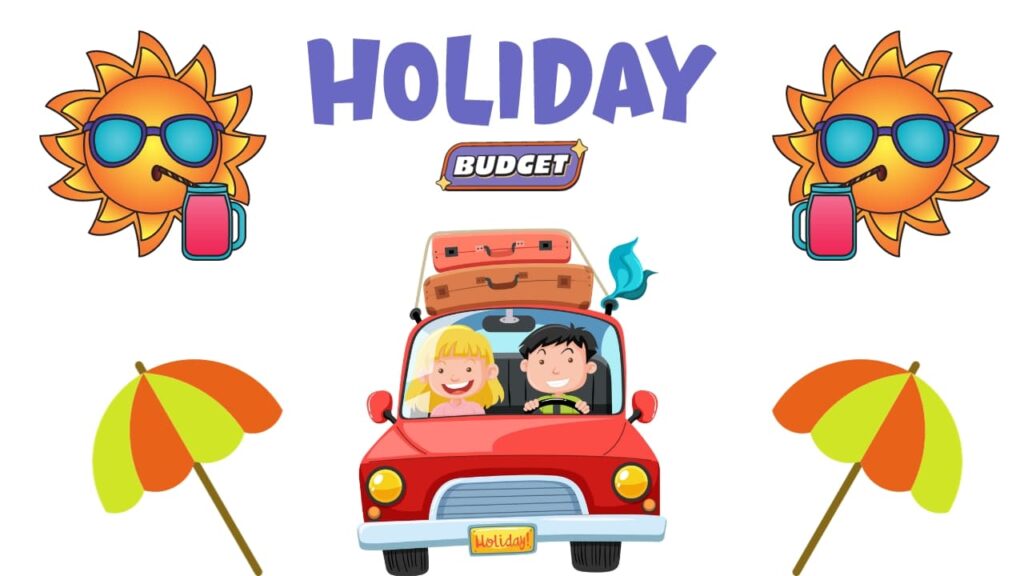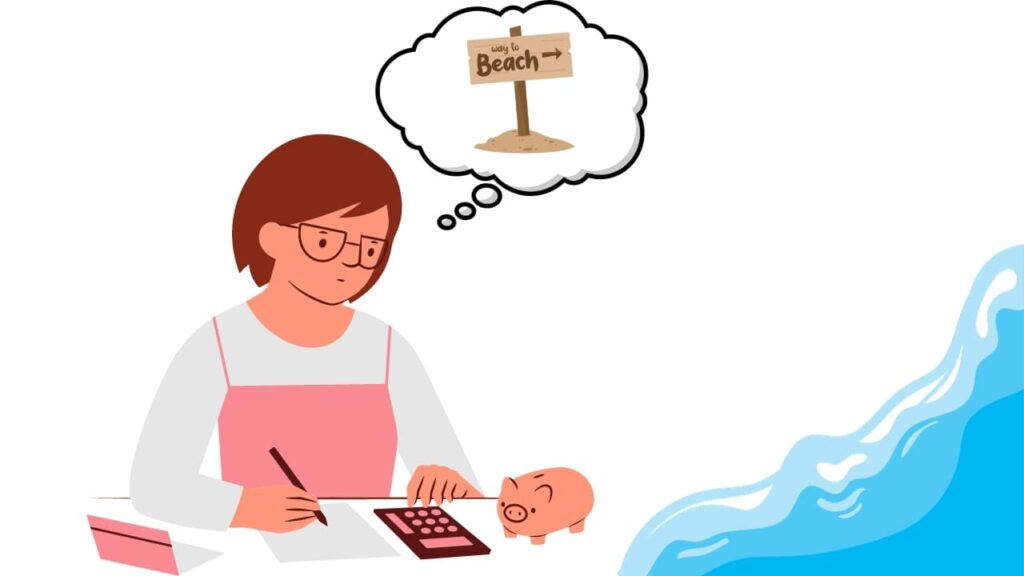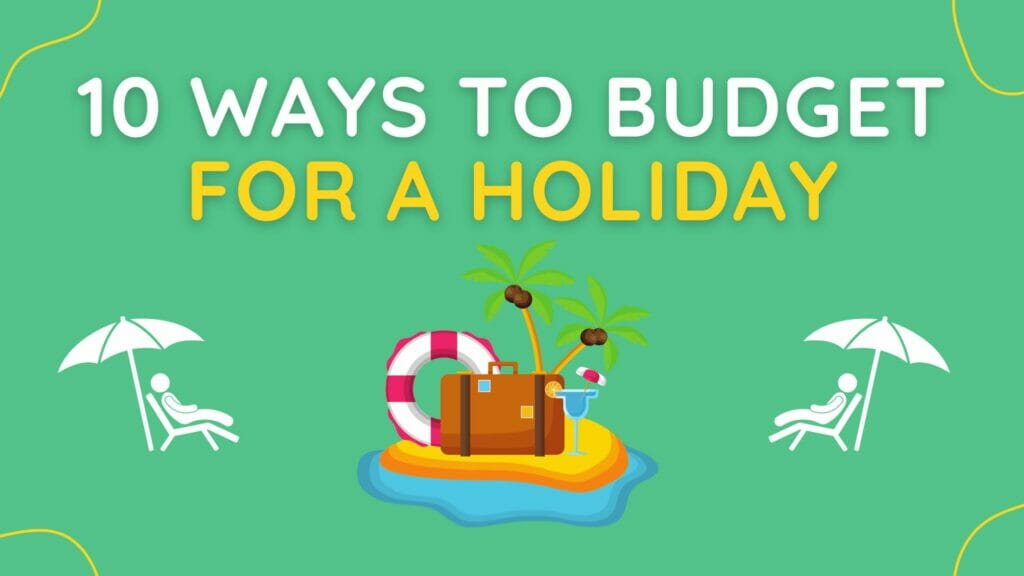
Sammie Ellard-King
I’m Sammie, a money expert and business owner passionate about helping you take control of your wallet. My mission with Up the Gains is to create a safe space to help improve your finances, cut your costs and make you feel good while doing it.
Holidays are fun and exciting. But they’re also expensive. In fact, reports in 2023 showed that the travel industry hit £870 billion by the end of that year.
Holiday costs are on the rise (just like everything else) but the getaway market is robust as people don’t want to stop spending money on experiences.
It’s so easy to get carried away when planning a trip which can actually damage the experience if you’re stretching yourself and the family too thin.
As such, you should take some time before your trip to budget and plan your spending. This way, you can avoid any unnecessary financial stress during your time away.
Often budgeting requires saving a large amount of money between you sometimes up to 10k a year depending on the type of holiday you’re going on and the size of the family. Although for holidays abroad usually a couple of thousand will do.
In this article we unpack some of our top tips to budget for a holiday.
Key Takeaways
- Save smart, travel smarter – plan early with a sinking fund to spread the cost without sinking your finances.
- Embrace flexibility, snag last-minute deals – your passport to affordable adventures.
- Go off the beaten path, live like a local, and watch your holiday budget stretch further than your suitcase space.
Table of Contents
How To Save For A Holiday
The sooner you start to save for a holiday, the better. Get ahead of the curve and start thinking about it early. You’ll thank yourself nearer the time.
One way to do this is to start saving is using what’s called a sinking fund technique. A sinking fund is a pot of money you add to over time at multiple occasions. This sinking fund is used for larger purchases like yearly insurance payments, holidays and one of the purchases.
For example, you could put £50 a month into your sinking fund and £20 here and there from a side hustle job or passive income business. Over 6-7 months, this can be the cost of a flight, but over a year, this could be a whole holiday!
I usually start planning my trips a few months in advance. This way, I can slowly save up money and don’t have to worry about last-minute expenses.
Listen To This Podcast 💯
Join us with Amy’s Budgeting, the hit Instagram channel with over 40k followers talking all about budgeting, saving and side hustles.
We discuss Amy’s approach to budgeting, sinking funds and so much more!
Hit the play button just below or get links to the full episode by clicking her name just above.

Holiday On A Budget
For those of us keeping a watchful eye on our spending, securing a budget holiday may seem daunting, but it’s entirely possible with a few insider tips.
Here’s how you can satiate your wanderlust without emptying your wallet:
Seek Out Off-Peak Deals: Timing is everything when you’re looking to cut costs. Travel during the off-peak season when prices for flights and accommodation plummet. Not only will you save money, but you’ll also avoid the crowds.
Last-Minute Offers: If you have the flexibility, last-minute deals can be a goldmine for budget travel. Tour operators often reduce prices to fill up unsold holiday packages. Keep an eye on travel websites and be ready to pack your bags at short notice for a bargain getaway.
Package Holidays: All-inclusive package holidays can often be more economical than booking flights and hotels separately. They also provide the added comfort of a fixed cost for the majority of your holiday expenses.
Comparison Websites: Utilise comparison websites to hunt down the best deals on flights, hotels, and holiday packages. These sites aggregate prices from various sources, ensuring you get the best possible deal.
Alternative Destinations: Instead of setting your sights on the usual hotspots, why not explore lesser-known destinations? Places with a lower cost of living typically offer cheaper accommodation and food, allowing your money to go further.
Rewards and Points: Make the most of any reward schemes or points you’ve accumulated through credit cards or loyalty programmes. These can often be redeemed for flights, upgrades, or even entire holidays.
Go Local: Opt for destinations where you can live like a local. Renting a self-catering apartment, shopping at local markets, and using local transport can drastically reduce the cost compared to a typical tourist experience.
How Much To Save For A Holiday?
Determining the approximate cost of your trip will give you a good starting point for planning your budget for a holiday.
To do this, list all the major expenses, such as flights, hotels, transport, entertainment, and shopping.
Last summer, I was budgeting for a trip to France the following year. The main costs were the flights, Airbnb, and car hire while I was there. I budgeted £150 for airfare, £500 for accommodation, and £300 car hire. I also included a £300 buffer for other miscellaneous expenses. Overall my budget was £1250.
I realised that by using the sinking fund method, I would challenge myself put £100 away a month for 12 months so when it came to the holiday, I had almost nothing to pay out of my paycheck.

10 Holiday Budgeting Tips
Once you have a good idea of the costs of taking your trip, start looking for ways to save. For instance, you can often find cheaper flights by being flexible with your travel dates and flying during off-peak times.
You can also save on lodging by staying in budget-friendly accommodations such as hostels or Airbnb rentals. And lastly, look for free or cheap activities at your destination, so you don’t have to spend much money on entertainment.
I saved money on my trip to France by flying on very early flights, and I stayed in budget-friendly lodgings, like hostels and Airbnb rentals. I also looked for free things to do in the cities I was visiting, such as checking out local attractions, visiting galleries and eating local.
1. Set a daily spending limit
Assuming you’ve already saved up for your holiday trip, setting a daily spend limit is an excellent way to ensure you don’t overspend while you’re away.
First, figure out how much money you have available to spend. This includes any cash you’ve saved up and any money you’ll have access to while on vacation, such as credit cards or traveller’s checks.
It would help if you then considered how long your trip would be. This step will help you determine how much money you can realistically spend each day. And then set a daily limit for yourself. This can be a set amount of cash or a ratio, such as spending no more than 50% of your available funds daily.
I like to take my daily spending limit and divide it into smaller amounts so I know exactly how much I can spend on different activities.
For example, if my daily spending limit is £100, food budget could be £40, £30 for transportation, £20 for activities, and £10 for souvenirs. This helped me when putting together my budget for a holiday.
2. Involve your kids
If you’re travelling with kids, it’s essential to involve them in the budgeting process so they understand the importance of money and how to spend it wisely.
One way to do this is to give them a daily allowance that they can use to purchase souvenirs or snacks. You can also set spending limits for activities or entertainment so they don’t go overboard.
Last year, we went on a trip to Disney World, and I gave my two kids a daily allowance of £30 each. They could use this money to buy souvenirs, snacks, or anything else. I also set limits for activities, such as only allowing them to spend £15 per day on rides and attractions.

3. Shop for affordable flights
One of the best ways to save money on your trip is to shop around for affordable flights and book them early. This step is critical, especially when travelling on a budget.
You have a range of reliable sites to help you find the best deals on airfare. Try comparing prices on different travel seasons before settling for one that suits your budget.
I usually start looking for flights about six months before my trip, which gives me plenty of time to compare prices and find the best deals.
I also set up price alerts so I can be notified of changes in flight prices. This step alone has saved me hundreds of pounds.
If possible try to travel outside of the school holidays (easier said than done) as this can also lower your flight costs.
4. Take on budget local experiences
As you budget for a holiday, don’t overlook cheap yet authentic activities. Try to focus on local experiences rather than tourist traps. This will help you save money and get a more authentic experience.
For instance, look for a local dive serving delicious (and affordable) food instead of going to a fancy restaurant. Or, instead of taking a tour of a popular attraction, explore the area on your own.
Also, consider eating at budget-friendly restaurants, exploring the cities on my own, and taking advantage of free tourist attractions.
5. Acquire a travel credit card
If you’re going to be spending a lot of money on your trip, it’s a good idea to get a travel credit card. This will allow you to earn rewards points that you can use towards future travel expenses.
Just be sure to pay off your balance in full monthly, so you don’t rack up any interest charges. Also, read the fine print so you know what fees you’ll be charged, as you don’t want a big fat bill after you’ve just landed back from a beautiful trip.
6. Use cash when possible
While using your debit or credit card when travelling is convenient, it’s not always the best idea. You’ll likely be charged foreign transaction fees, which can add up quickly. Instead, try to use cash as much as possible.
The idea will help you avoid these fees and stick to your budget.
Of course, there are some situations where using cash isn’t possible, such as booking a hotel room or renting a car. In these cases, it’s best to use a credit card that doesn’t charge foreign transaction fees.
Check with your bank before you leave and if needs be shop around for a provider that will give you no transaction fees.
7. Avoid taking out cash advances
Suppose you do need to use your credit card while travelling. Avoid taking out cash advances. You’ll be charged a higher interest rate and may have to pay additional fees.
If you need cash, try to find an ATM that doesn’t charge a withdrawal fee. You can also ask your bank if they have any partners in your location. This way, you can avoid paying ATM fees altogether.

8. Budget for travel insurance
Before you budget for a holiday trip, get travel insurance. Insurance will protect you in the case of an emergency, such as an accident, theft or lost luggage.
While travel insurance isn’t required, it’s always a good idea to have it just in case something goes wrong. I once got stung by a jellyfish on the beach and needed an injection to help with the swelling. The injection cost me £90 upfront and the doctor was £60. I didn’t have any travel insurance, so I lost out on £150.
9. Download a budgeting app
A few budgeting friendly apps can help you save money and time while on your trip.
For instance, the app Trivago can help you find last-minute hotel deals. This is great if you need a place to stay but don’t want to spend much money.
Another helpful app is straight-up good old Google Maps. This will help you navigate your way around a new city without getting lost (and racking up an expensive data bill).
Finally, an app like Revolut can help you budget for your trip by allowing you to convert currency. This is especially useful if travelling to multiple countries with different currencies.

10. Stay flexible with your plans
One of the best ways to save money while travelling is to stay flexible with your plans. This means being open to changes, such as taking a different route or staying in another hotel.
Of course, it’s crucial to have a basic plan in place. But, don’t be afraid to change things up if it means you’ll save money.
For instance, I had to change my flight home from LA because the airline was overbooked. While I had to stay an extra day in Toronto, I could get a free flight home. So, it all worked out in the end.

How To Save Money Quickly For A Holiday
To save quickly for a holiday, you’ll want to employ aggressive yet realistic holiday saving strategies. Here are some punchy pointers:
Trim the Excess: Audit your spending and cut back on non-essentials. Every pound saved is a step closer to your sun lounger.
Monetise the Mundane: Sell items you no longer need, take on extra work, or turn a hobby into cash flow – your clutter and skills can fund your next escape.
Automate to Accumulate: Set up an automatic transfer to a dedicated holiday savings account on payday – if you don’t see it, you won’t spend it.
By implementing these focused strategies, you can accelerate your savings and turn your holiday dreams into imminent departures.
How Much Money Should I Take On Holiday?
The amount of money you should take on holiday depends on several factors, including your destination, the length of your stay, your planned activities, and your personal spending habits.
Here are a few guidelines to help you budget accordingly:
1. Daily Spending Budget: Research the cost of living in your destination and estimate a daily budget that covers food, drink, local transport, and entertainment.
2. Accommodation and Travel: Pre-book your accommodation and flights, as these are typically your biggest expenses.
3. Emergency Fund: Always have a contingency fund, around 10-20% of your total budget, for unexpected expenses.
4. Pre-Planned Activities: Budget for excursions, tours, and experiences you know you want to enjoy.
5. Souvenirs and Shopping: Decide in advance how much you’re willing to spend on extras like shopping.
Remember, always tailor your budget to your financial situation, and don’t forget to inform your budgeting with up-to-date information on currency exchange rates for your travel money and the economic climate of your holiday destination.
Things to watch out for
For me it’s always important to have a 10-20% contingency budget for the costs that creep up on your or that we always forget.
Aside from food and drink you’re going to have things like:
- Excess baggage fees
- Fuel costs
- Public transport
- Card fees
- Data costs and roaming
What percentage of income should be spent on holidays?
A good amount is around 4-5% of your total income. For example, if you earn the average UK salary of £33,000 a year this works out as £2,154 a month or £25,851 a year.
5% of that yearly amount is £1,292.55 which would give you a healthy budget and allow you to go somewhere nice abroad for a week or two.
Conclusion
Creating a budget for a holiday can be daunting, but it doesn’t have to be. Following these essential budget tips can save money and enjoy your trip without breaking the bank.
Do you have any budget-friendly travel tips? If so, please share them in the comments below. Happy travels!
Share on social media
Disclaimer: Content on this page is for informational purposes and does not constitute financial advice. Always do your own research before making a financially related decision.


